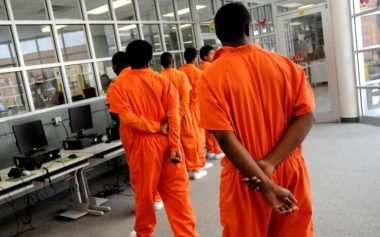The State of Louisiana is looking to make major changes in its juvenile jurisdiction process.
According to American Press, state senators voted 36-1 Tuesday for a bill that would grant parole hearings to anyone sentenced to life in prison for first or second-degree murder who was a juvenile when the crime was committed.
Offenders would be required to serve 35 years of their sentence, refrain from committing any major disciplinary infractions, complete a pre-release program and substance abuse training (if needed), and earn their GED or other job skills training, the news site reports.
The legislation comes just four years after Miller v. Alabama (2012). According to The Intercept, the Supreme Court banned mandatory life sentences without parole for juvenile offenders and deemed such sentences unconstitutional.
Despite the justices’ decision, many states declined to apply the ruling to those already in prison. Louisiana happened to be one of them. However, an October 2015 Supreme Court case provided a glimmer of hope to offenders serving life without parole for crimes they committed before the age of 18.
The Montgomery v. Louisiana ruling, handed down in January of last year, upheld the previous Miller v. Alabama injunction on juvenile sentences without the possibility of parole. Now, the ruling is applied retroactively, for inmates already serving time behind bars.
Louisiana is close to passing another key piece of juvenile justice reform legislation. The Pelican State is working to “Raise the Age” at which minors can be charged as adults and sentenced to life in prison. According to Think Progress, the Louisiana Senate voted 33-4 in favor of enacting the bill. Gov. John Bel Edwards pledged to sign the legislation if it passed in the House, too.
“Raising the age of juvenile jurisdiction, as this legislation proposed, makes sense,” Gov. Edwards said in a statement. “In Louisiana, adult usually means 18. Seventeen-year-olds can’t vote, serve on juries, join the military, or buy a lottery ticket. There’s only one exception: Kids are automatically charged, jailed and imprisoned as adults the day they turn 17, regardless of their offense.”
According to Bryan A. Stevenson, founder and executive director of the Equal Justice Initiative, sentencing a child to life without parole is essentially “cruel and unusual punishment.”
“Kids do stupid things. All kids do bad things,” Stevenson said. “Poor kids, kids who are living in the streets, kids who have no family…kids who have been subjected to a lot of trauma…tend to do bad things that are much worse, that could be violent, that could be criminal. But they’re still kids and their capacity to change is enormous. And to ignore that capacity to change is to deny their child status. And I think that’s cruel.”
Stevenson also points out that the majority of children sentenced to life in prison are youth of color.
“All of the kids who’ve been sentenced to life without parole for non-homicides are African-American,” he explained. “Most of the kids, 13 and 14, who have been sentenced to die in prison are kids of color; African-American, Latino, Native American.”
Louisiana’s recent push to grant parole to juvenile lifers has proved successful for some. American Press reports that an April ruling by Judge Guy Bradberry allowed 52-year-old Ramus Benoit Jr. to change his original charge of first-degree murder to manslaughter. The change made Benoit eligible for immediate release from prison. According to the news site, the Lake Charles resident was convicted of murder in 1982 when he was just 17 years old.



